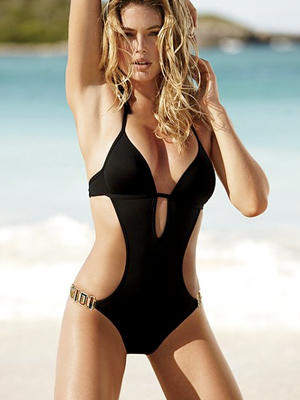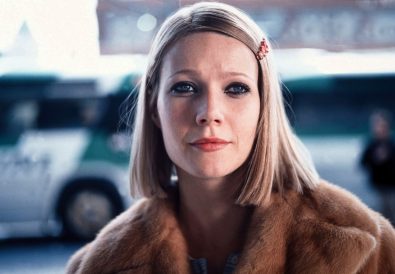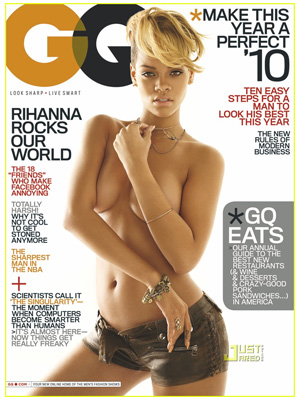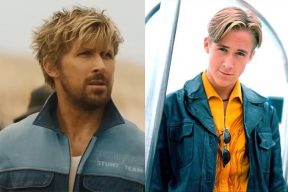Listen: it’s 2015, and we all know now that backlashes are inevitable. They happen. At one point, we were upset about seeing ‘Lil Bub all over the place, and that is a cat who breathes through its mouth/is very adorable. So, I mean, a Taylor Swift backlash was to be expected — especially since she is everywhere all the time and somehow managed to make Kanye West’s Vanguard win this weekend all about her. (Maybe because he is her friend, thank you very much, I’m not sure.)
But in addition to us rolling our eyes at Taylor’s affinity for welcoming every famous person on earth — dead or alive, ghost or ghoul — to whatever stage she happens to be on, she’s also recently come under fire for her new video, “Wildest Dreams,” which critics believe romanticizes colonialism. Why? Because it takes place in Africa and includes approximately zero black actors, and also does a bang-up job of paying homage to the “white colonial fantasy of Africa.” And director Joseph Khan disagrees.
“It is not a video about colonialism, but a love story on the set of a period film crew in Africa, 1950,” he explained, adding that it’s supposed to pay homage to the relationship between Elizabeth Taylor and Richard Burton (as if “Liz & Dick” never happened, I guess).
“The reality is not only were there people of colour in the video, but the key creatives who worked on this video were people of colour,” he continued. “I am Asian American, the producer Jil Harden is an African American woman, and the editor Chancler Haynes is an African American man. We are all proud of our work.”
Okay. Sure. But while “Wildest Dreams” video is indicative of a larger, systemic issue, the controversy surrounding it is also indicative of reaching Peak Swift. As pointed out by writer Tom Barnes, the last few weeks have seen a bevy of T-Swift takedowns, which all point to one thing: “We love our pop stars — until we realize they are deeply, deeply fake.”
Woof. Yep. Once upon a time, Swift was a teen girl who made mistakes, prided herself on them, and was believable as our universal bestie, which is becoming harder to own thanks to her gargantuan success, social and economic influence, and the fact she managed to change Apple’s entire business model with only a strongly-worded email. (Or blog. Or something.)
But the thing is, her problem isn’t so much her evolution (like, hi: it’d be profoundly bizarre if she was trying to be a teenager at 25 years old), but how public her evolution has become. As teens and twenty-somethings, most of us start to question the norms around us, and tend to have the luxury of figuring who we are/what we subscribe to out in the privacy of our small social circles. Taylor, on the other hand, once spoke out against feminism (like most of us have before learning how things work), has come to embrace it thanks to Lena Dunham, and then went on to wade into Nicki Minaj’s call-out of MTV’s lust for whiteness by taking it personally and making it about her. And of course, we, at some point or another, have all fucked up. That’s how we learn. But the problem here is less that Taylor is making mistakes, and more the unstoppability of her career/influence/public-ness which allows her to make them on such a grand scale.
Confidence is important. Confidence is great. But when you’re still navigating the ins and outs of major social and political platforms (feminism being one), it’s important to put your listening ears on before taking to the stage with every human in the name of sisterhood and/or publicity. Not everybody’s feminism is the same. White feminism, in Swift’s case, is very prevalent. (That feminism should mean “sisterhood” is a privilege the majority of women don’t have the luxury of prioritizing at all.) And while Swift’s heart is in the right place (I hope), it’s still hard to maintain enthusiasm for a person who’s so sure she’s doing everything right that she’s not really listening to anybody else.
That’s where I think the root of the backlash is. It’s hard to talk (nay, converse) above the sound a multi-billion dollar celebrity is making, but it’s even harder to rally around that celebrity when you realize they’re still a young 20-something who’s yet to learn humility. To become a real person, you have to be humble. You have to understand that sometimes people say “no.” You have to get that the same doors afforded to you are not afforded to 99% of the rest of the human world, and you have to fuck up enough to hit bottom, apologize and/or fix your shit, and then get stronger.
I don’t think Taylor Swift is a bad person because I don’t know Taylor Swift in any way. But I do know that all hell breaks loose when unstoppable forces (her) meet immovable objects (issues that won’t be fixed by bringing Joey from Friends to the stage), and that the most interesting, well-rounded, and smart people I know pause to ask questions and grow even if they’re sitting on top of the world.
I mean, all Taylor had to do was say, “Why don’t we model this video after, ‘Who’s Afraid of Virginia Woolf?'” Or even better: Lifetime’s “Liz & Dick.”












